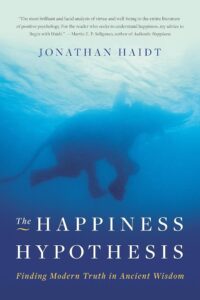„THE HAPPINESS HYPOTHESIS” de Jonathan Haidt
 Am multe cărți de psihologie pe care le-am citit acum zece, cinsprezece ani și despre care nu am scris nimic. Motivele sunt:
Am multe cărți de psihologie pe care le-am citit acum zece, cinsprezece ani și despre care nu am scris nimic. Motivele sunt:
– la prima lectură nu am înțeles toate conceptele descrise de autor,
– a trebuit să mai recitesc din când în când cartea,
– a trebuit să citesc și alți autori de la care am învățat altceva și în baza noilor cunoștințe am reușit să înțeleg mai mult din prima carte.
Așa s-a întâmplat cu Jonathan Haidt și cartea lui „The Happiness Hypothesis”. Anul acesta am recitit-o (nu știu pentru a câta oară) și am înțeles mult mai multe lucruri decât acum optsprezece ani.
Însă ce mi-a atras atenția de această dată a fost:
„People benefit from traumas, crises, and tragedies in three primary ways:
1. Rising to a challenge reveals your hidden abilities, and seeing these abilities changes your self-concept.
2. Adversity strengthens relationships and it opens people’s hearts to one another.
3. Trauma changes priorities and philosophies toward the present and toward other people.
The adversity theory has a weak and a strong version:
– in the weak version, adversity can lead to growth, strength, joy and self-improvement.
– in the strong version, people must endure adversity to grow, and the highest levels of growth and development are only open to those who have faced and overcome great adversity.
If the strong version of the hypothesis is valid, it has profound implications for how we should live our lives and structure our societies.
It means that we should take more chances and suffer more defeats.
It means that we might be dangerously overprotecting our children, offering them lives of bland safety and too much counseling while depriving them of the <<critical incidents>> that would help them to grow strong and to develop the most intense friendships.
It means that heroic societies, which fear dishonour more than death, or societies that struggle together through war, might produce better human beings than can a world of peace and prosperity in which people’s expectations rise so high that they sue each other for <<emotional damages>>.”
Editura: BASIC BOOKS, 2006

Recent Comments